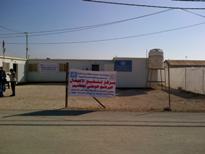The main health concerns that currently face the Syrian refugees are upper respiratory tract infections, diarrhoea, and skin conditions. Chronic diseases include gastro-intestinal complaints, hypertension, asthma, diabetes and cardiovascular conditions.
In partnership with UNICEF, World Food Programme (WFP), Office of the United Nations High Commissioner for Refugees (UNHCR), United Nations Population Fund (UNFPA), Ministry of Health of Jordan and the Department of Statistics, WHO has completed the nutritional assessment of children under the age of five years and women of child-bearing age through a cluster sample approach of Syrian refugees in Jordan. This survey is designed to additionally assess the food intake of Syrians refugees aiming to eventually improve the quality of their diet. The findings of the nutritional assessment are likely to be published by the end of November.
One of the issues that is also being addressed is the problem of intestinal parasites. WHO is working with the Ministry of Health to implement a deworming campaign that will see 250 000 deworming tablets provided to school children 5–14 years of age, both Syrians and Jordanians. Led by the Ministry of Health, WHO and UNICEF are planning the measles and polio immunization campaign for Irbid and Mafraq, coupled with the vitamin A supplementation, which will begin in the near future. This campaign targets both Syrian and Jordanian children.
As the refugees are currently living in desert conditions where snakes and scorpions are also present, WHO and its partners have requested the delivery of anti-venom medication. The supplier, the type of anti-venom, and the specific amount have been finalized, and WHO expects the first delivery of the anti-venom to happen before the end of 2012.
WHO continues to raise funds for its projects and initiatives, through submitting proposals to potential donors. WHO actively participates in various health coordination meetings both inside and outside the Zatari camp. WHO is also working with the Ministry of Health to strengthen the disease surveillance system outside the camp. WHO also supports three community mental health centres in Jordan, which provide mental health services to Syrians, Iraqis, and Jordanians.
As the influx continues, WHO and its health partners endeavor to provide health assistance to the refugees in Jordan. WHO believes that the health of the refugees is of paramount importance, not just to the individual, but to the communities as a whole.








 Medical support a top priority for fleeing individuals
Medical support a top priority for fleeing individuals